If you’re in search of an adorable and intelligent companion, look no further than Cavoodle puppies. These lovable little dogs are a crossbreed between Cavalier King Charles Spaniels and Poodles, resulting in a delightful combination of traits from both breeds. In this article, we will explore everything you need to know about Cavoodle puppies, from their appearance and temperament to their care and training.
Basic Information about Cavoodle Puppies:
| Attribute | Description |
|---|---|
| Dog Colour | Cavoodles have long silky coats that come in many different colours including black, cream or white with brown patches. |
| Weight | The weight of a Cavoodle can vary depending on the size of their Poodle parent, but generally, they fall within the range of the Cavalier King Charles Spaniel (13-18 pounds) and the Toy Poodle (4-6 pounds). |
| Size | Cavoodles are considered a small breed. |
| Dog Height | The height of a Cavoodle can also vary, but they generally fall within the height range of the Cavalier King Charles Spaniel (12-13 inches) and the Toy Poodle (around 10 inches). |
| Life Span | Cavoodles have a life expectancy of 10-15 years. |
| Price | The price of a Cavoodle puppy can vary greatly depending on various factors such as the breeder’s reputation, the puppy’s color, size, and lineage, and the location of the breeder. It’s always recommended to research and choose a reputable breeder. |
Please note that these are general characteristics and individual dogs may vary. Always consult with a vet or a professional breeder for more accurate information. 🐾
Quick Facts
| Attribute | Description |
|---|---|
| Evolutionary Origins | Cavoodles are a mix between a Cavalier King Charles Spaniel and a Poodle. They were first bred in the United States in the 1950s. |
| Physical Appearance | Cavoodles may take on characteristics of either parent breed. They have a brown, blonde, white, black, gold, and tawny hypoallergenic coat, round face, and long ears. |
| Reproduction | Cavoodles are a crossbreed, so their puppies may not have mixed parents, instead of being bred between two Cavoodles. |
| Breed Group | Cavoodles are considered a toy dog/designer dog breed. |
| Coat | Cavoodles can have two main coat types: a shorter, curly coat (Poodle dominant) or a longer, silkier coat (Cavalier King Charles Spaniel dominant). |
| Temperament | Cavoodles are good-natured, affectionate, and playful. They are also well suited to people with allergies as they are less likely to shed. |
| Intelligence | Cavoodles are one of the smarter dog breeds. |
| Play Time | Cavoodles are energetic and require regular playtime. They enjoy both indoor and outdoor games. |
Remember, these are general characteristics and individual dogs may vary. Always consult with a vet or a professional breeder for more accurate information. 🐾
Appearance
Cavoodle puppies are known for their charming looks. They typically have soft, wavy or curly coats that can come in a variety of colors, including black, white, apricot, and gold. Their eyes are round and expressive, and their ears are long and floppy. These puppies have a compact and sturdy build, making them perfect for both indoor and outdoor activities.
Helpful Tips for Cavoodle Puppies: Puppy Growing
Temperament
One of the most appealing aspects of Cavoodle puppies is their friendly and affectionate nature. They are known for being great family pets and get along well with children and other animals. These dogs thrive on human companionship and are eager to please, making them highly trainable. Cavoodles are also known for their intelligence, which makes them quick learners and adaptable to various living situations.
Care
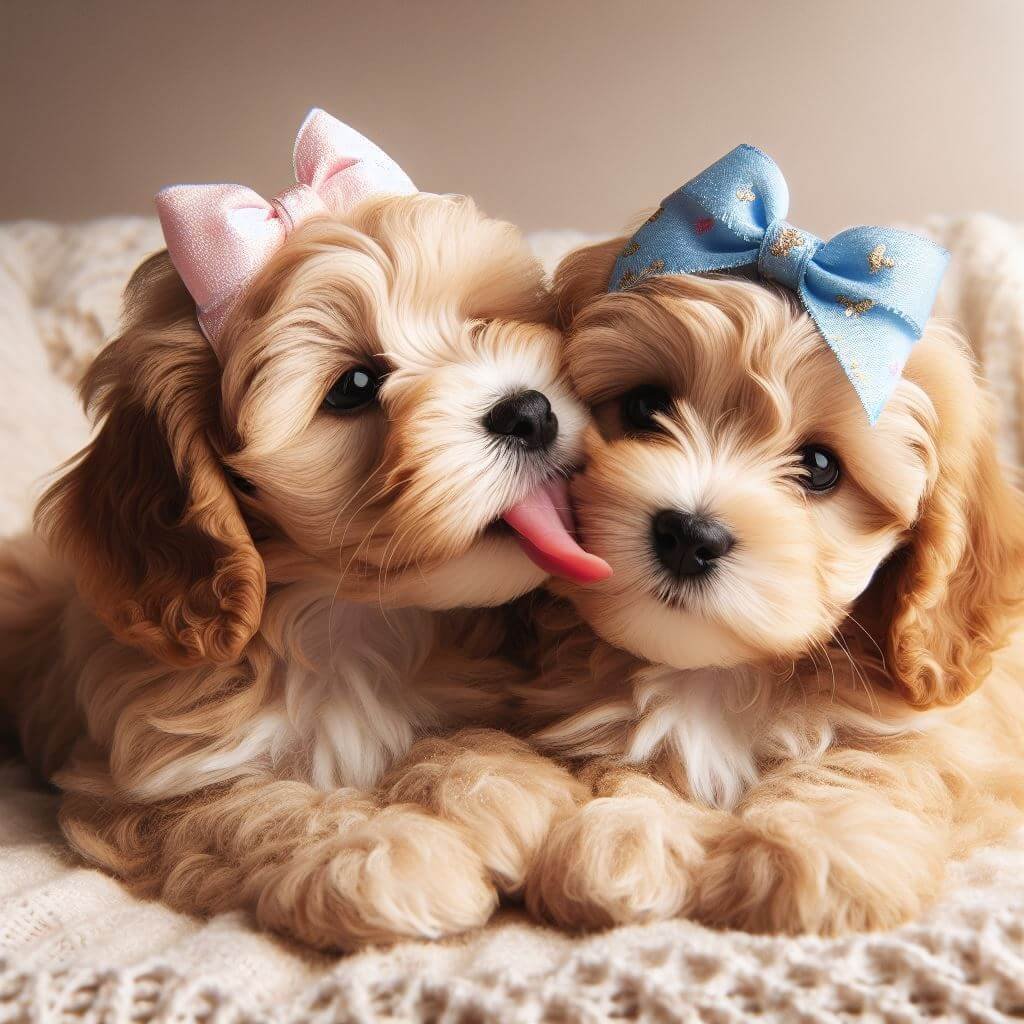
cavoodle puppies caring
Cavoodle puppies require regular grooming to keep their coats healthy and free from matting. Their hair can grow quite long, so occasional haircuts may be necessary. Brushing their coats a few times a week will help prevent tangles and keep their fur looking its best. Additionally, regular dental care, such as brushing their teeth and providing dental treats, is essential for their oral health.
Cavoodles are generally active dogs and require daily exercise to keep them happy and healthy. This can include walks, playtime in the backyard, or interactive games. Mental stimulation is just as important as physical exercise for these intelligent dogs, so providing puzzle toys or training sessions can help keep their minds sharp.
Grooming
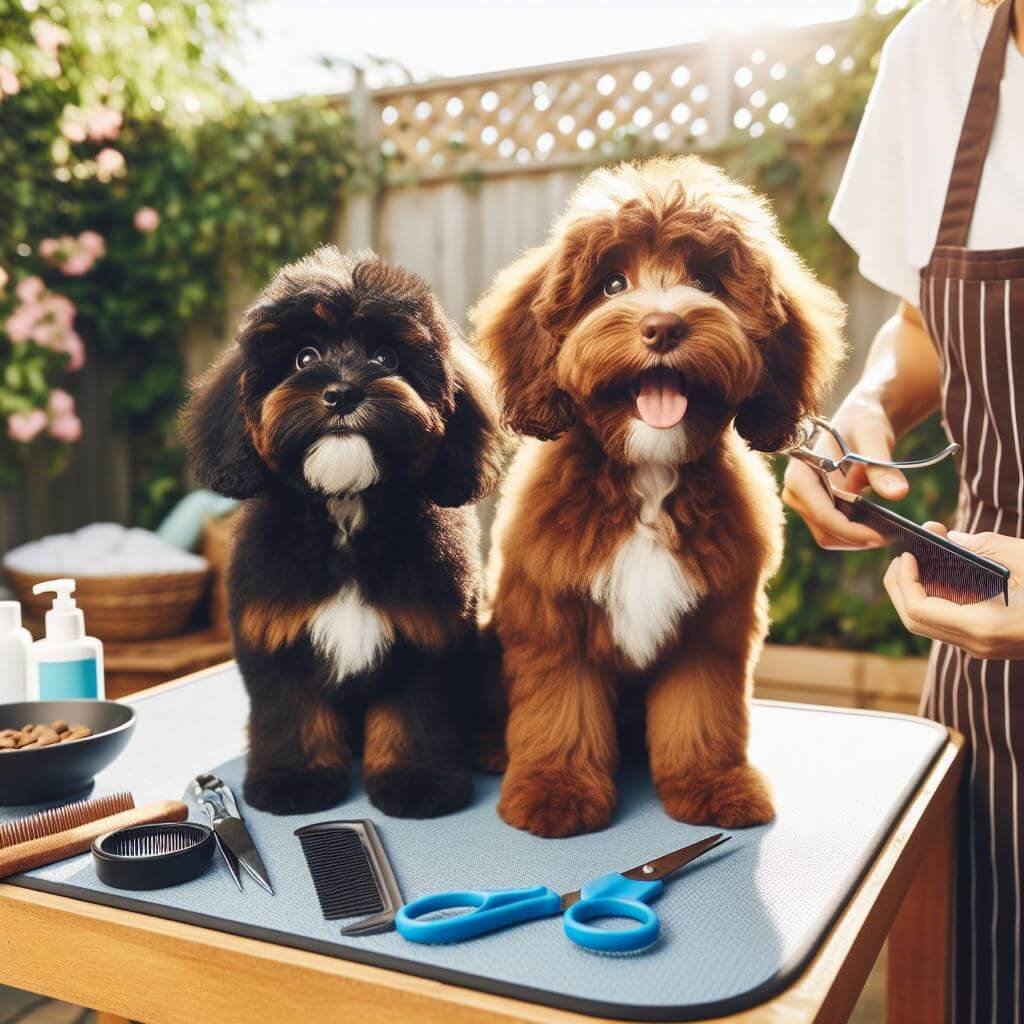
cavoodle puppies grooming
Coat Type: Cavoodles generally have a long coat which can be straight or wavy depending on whether they have inherited a Poodle coat or a Cavalier coat. Most Cavoodles inherit Poodle-like coats, which don’t shed very much but get tangled quite easily.
As a result, these types of coats require brushing at least 4 or 5 times a week.
Grooming Steps:
There are seven main steps to grooming a Cavoodle:
- Nail Trimming: Regularly trim your Cavoodle’s nails to prevent discomfort and potential health issues.
- Ear Cleaning: Clean your Cavoodle’s ears regularly to prevent infections.
- Eye Cleaning: Regularly clean around your Cavoodle’s eyes to prevent tear stains and infections.
- Tooth Cleaning: Brush your Cavoodle’s teeth regularly to maintain oral health.
- Bathing: Bathe your Cavoodle every two weeks or so to keep their coat clean and healthy.
- Brushing: Brush your Cavoodle’s coat every few days to prevent matting and tangling.
- Hair Trimming/Shaving: Trim or shave your Cavoodle’s hair every six weeks on average, either at home or by a professional groomer.
Grooming Frequency: As a rule of thumb, a Cavoodle should get a full groom and trim every six weeks. But shorter grooming sessions, involving bathing, nail trimming, and ear cleaning, should happen at least every two weeks.
Grooming Equipment: To groom your Cavoodle properly, you need the right equipment.
Here’s a list of essentials:
- Slicker Brush
- Comb
- Clippers
- Nail Clippers
- Dog Shampoo and Conditioner
- Scissors and Thinning Shears
- Ear Cleaning Solution
Remember, these are general guidelines and individual dogs may vary. Always consult with a vet or a professional groomer for more accurate information. 🐾
Training
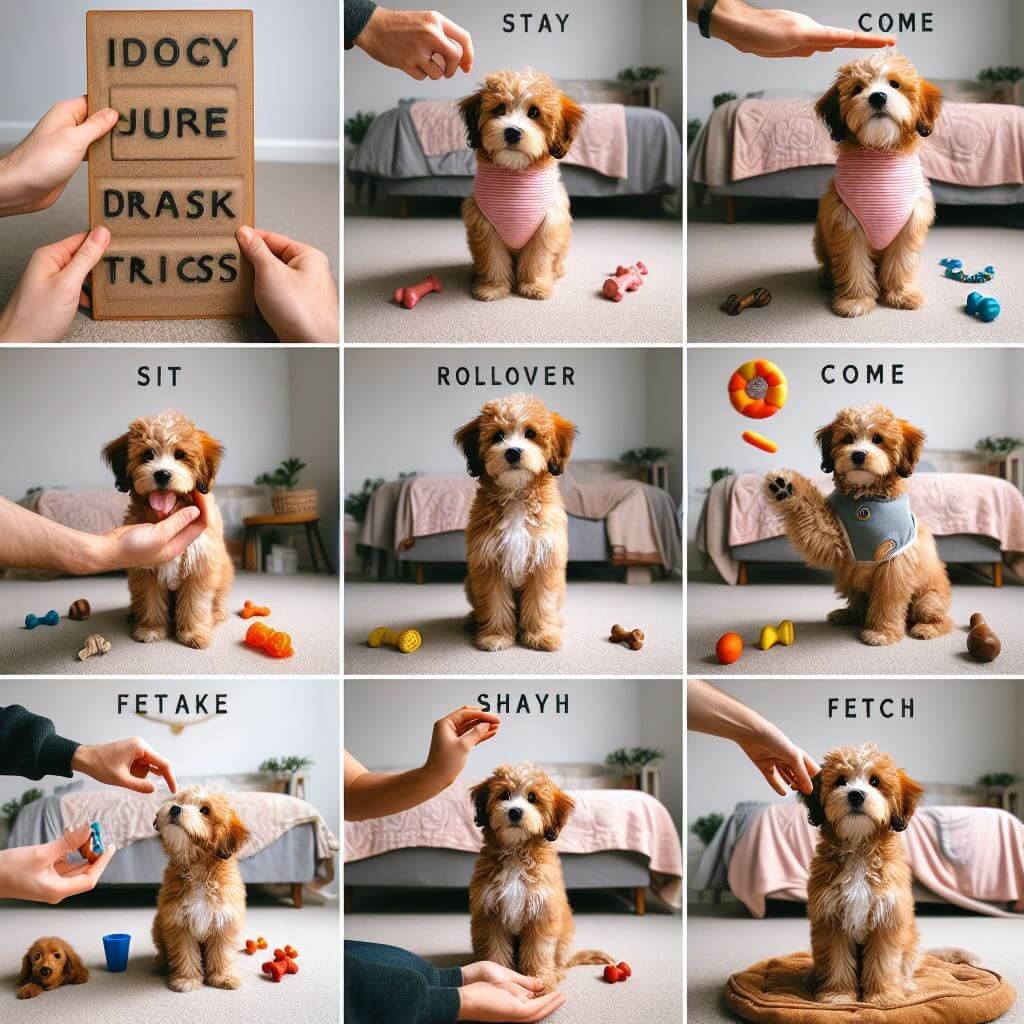
cavoodle puppies training
Training a Cavoodle puppy is a rewarding experience due to their intelligence and eagerness to please. Positive reinforcement methods, such as treats and praise, work best with these dogs. They respond well to consistent training and socialization from an early age. Basic obedience commands, such as sit, stay, and come, should be taught to ensure they grow up to be well-behaved and obedient companions.
Cavoodles are intelligent and eager to please, making them relatively easy to train. Training should be consistent and positive reinforcement should be used.
Training Tips
- Always use positive reinforcement.
- Be consistent.
- Use a clicker for consistency.
- Don’t rely solely on treats for rewards.
Exercise
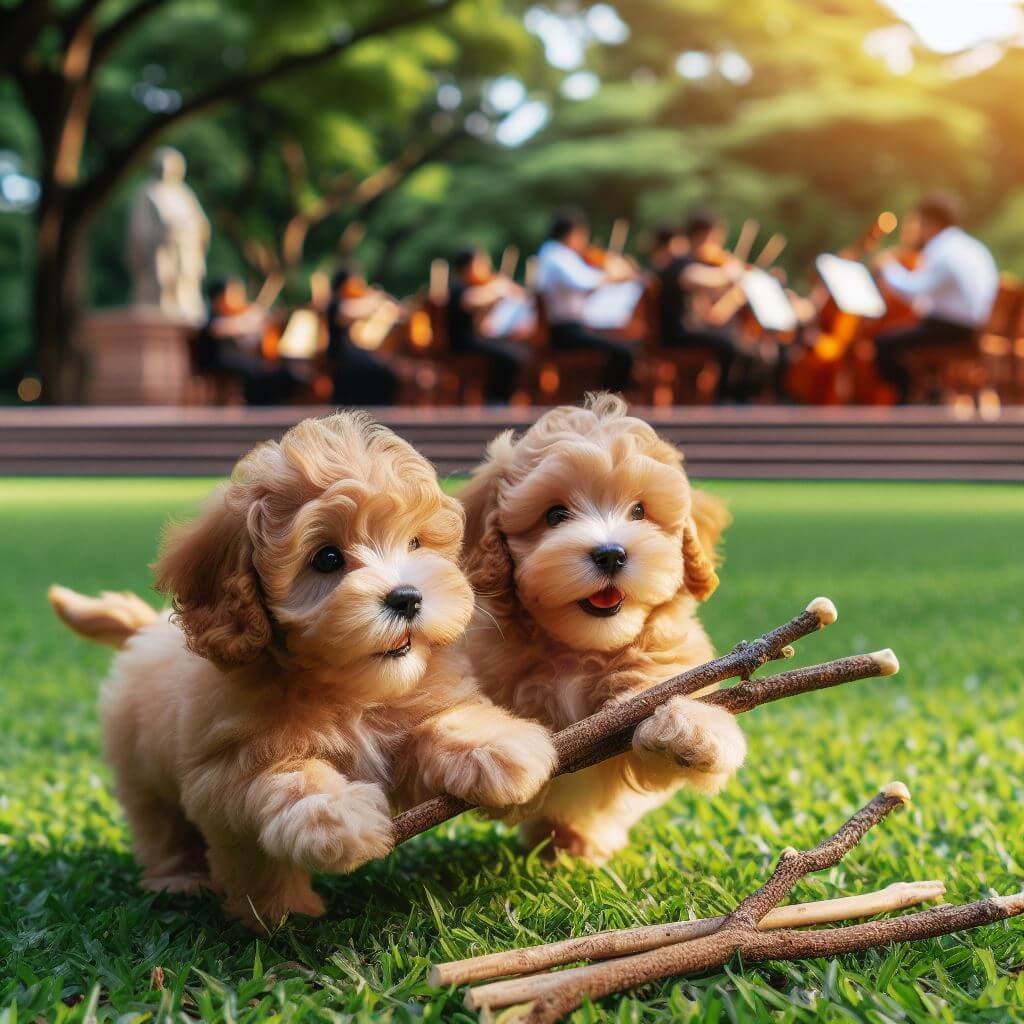
cavoodle puppies exercise
Cavoodles require a moderate amount of daily exercise of between 30 to 60 minutes. This should include a walk either on or off leash and some free play and activity. Mental stimulation is also crucial to prevent boredom. Swimming and playing fetch are also great ways to exercise your Cavoodle.
Socialisation
Cavoodles are very sociable dogs. They get along well with kids and are suitable for the elderly. Early socialisation is important for Cavoodles and can help prevent them from developing destructive behaviours.
Communication
Cavoodles are known to be quite vocal and can bark often at new people, sounds or animals as well as needing attention. They have the ability to whimper and cry which can alert their owners to their needs.
Care Taker
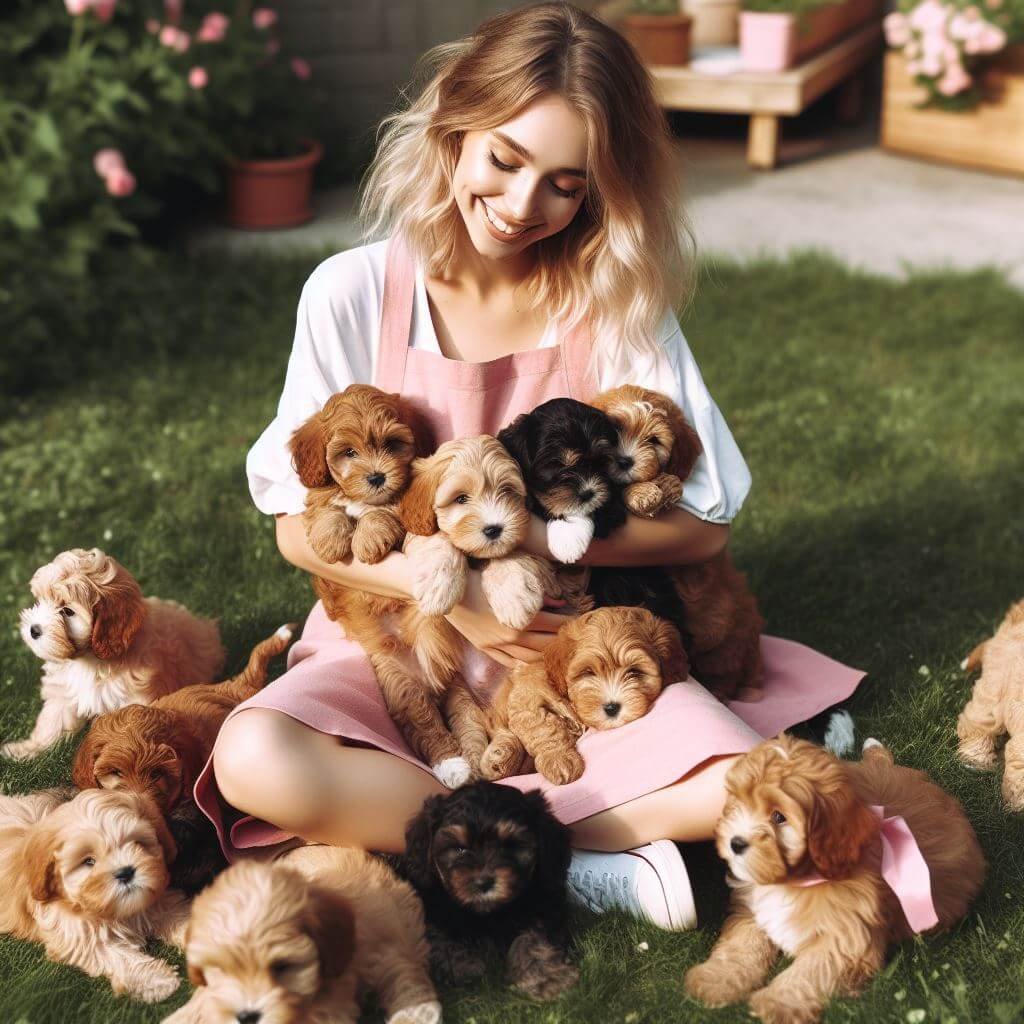
cavoodle puppies Care Taker
Caring for a Cavoodle puppy requires dedication, patience, and love. They require regular checkups with the vet, a balanced diet, and proper grooming habits. It’s also important to ensure they get plenty of exercise and mental stimulation.
Health
Cavoodle puppies are generally healthy dogs, but like all breeds, they can be prone to certain health issues. Some common conditions that may affect Cavoodles include hip dysplasia, heart problems, and eye diseases. Regular veterinary check-ups and a balanced diet are crucial for maintaining their overall health and well-being.
Food and Diet
Dietary Requirements: Cavoodles have different dietary requirements throughout their life. As a Cavoodle grows, the pet food that Cavoodle puppies eat changes as well.
From puppyhood to adulthood, the dietary requirements for a dog must fit the needs of the dog at its current stage of life.
Feeding Frequency: Cavoodle puppies should be eating 3 – 4 times a day, and sometimes as often as 5.
Type of Food: Cavoodles will stay healthiest and live the longest with a raw and fresh diet. This should include raw, human-grade produce from meat, offal, vegetables, and bone content.
Commercial Dog Food: The best dry dog food for most Cavoodles would probably be a high-quality feed like Blue Buffalo. Cavoodles need a protein-rich, nutrient-filled dog food in order to keep them happy and healthy.
Benefits of a Fresh Food Diet: Benefits of a fresh food diet for your cavoodle include better heart health, increased energy levels, shiny coats, improved breathing, improved vision, and stronger stool.
Remember, these are general guidelines and individual dogs may vary. Always consult with a vet or a professional breeder for more accurate information. 🐾
Games
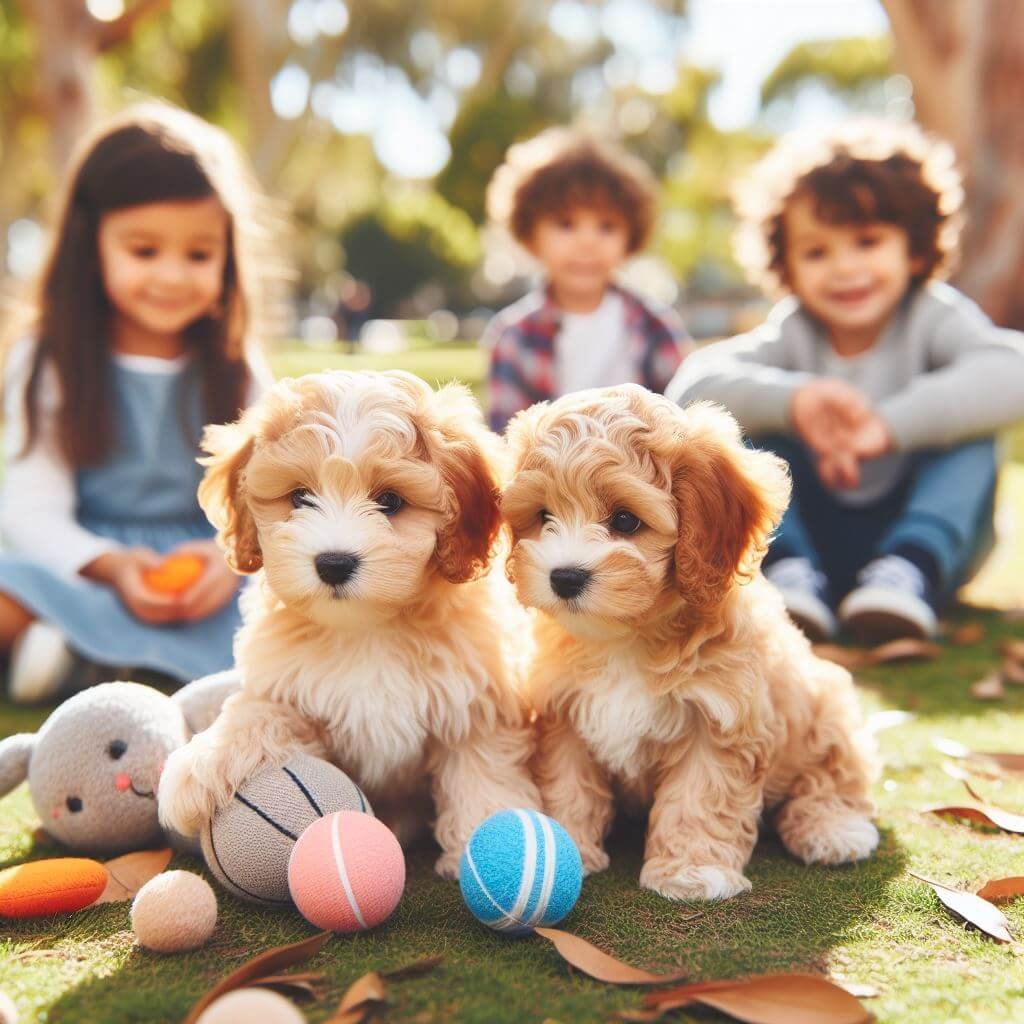
cavoodle puppies playing with kids
Indoor Games:
| Game | Description |
|---|---|
| Build an Agility Course | Create a course in the living room using everyday objects like stacked blankets, towels, and pillows to jump over, a hula hoop to jump through, a large open-ended box to crawl through, a basket and a few toys to place inside, a low ottoman or step stool to jump on, a pole or broom placed across two boxes to leap over, and a ball or flying disc to catch. |
| Magic Cups | Use three large plastic cups and a tennis ball. Place the tennis ball under one of the cups, then shuffle all three cups in front of your canine pal. Then, tell them to find it. |
| Hide and Seek | Hide and seek is a fun indoor game that the whole family will enjoy. All you need is your dog’s favorite toy. |
| Enhance Basic Skills | Make learning an entertaining indoor game for dogs anytime by expanding their basic skill ability. |
Outdoor Games:
| Game | Description |
|---|---|
| Bubble-it-up | This game involves blowing bubbles for your dog to chase and pop. |
| Name Games (Round Robin and Beyond) | This game involves calling your dog’s name and rewarding them when they respond. |
| Hide and Seek | This game involves hiding from your dog and rewarding them when they find you. |
| Aquatic Adventures | Most Cavoodles enjoy swimming and playing in the water. |
| Tug-of-War | This game involves a rope or a tug toy. |
| Any Ball Game | Fetch is a classic game that most dogs love. |
| The Digging Box | If your dog loves to dig, consider creating a designated digging box in your yard. |
| Dog Treasure Hunt | Hide treats or toys around your yard and let your dog find them. |
| The Flirt Pole | A flirt pole, also known as a “flirt stick”, is a piece of exercise equipment for dogs that entices a dog to chase a fast moving lure. |
| DIY Agility/Obstacle Course | Setting up an agility course in your backyard can be a fun and challenging game for your Cavoodle. |
Remember, the type of game and its intensity should be appropriate for your Cavoodle’s age, health, and preferences. Always ensure their safety while playing. Enjoy your playtime with your Cavoodle! 🐾
Relationship between Human and Dog
Cavoodles are known for their gentle nature and the strong bonds they form with their human companions. They are truly gentle, friendly, and very affectionate towards their families. They do not compromise loyalty and value their bond with human companions. They are pack animals.
The Bond Between Humans and Dogs
The emotional bond that develops between a Cavoodle and its owner is profound and heartwarming, offering a unique kind of companionship that’s full of affection, loyalty, and fun. From playful outdoor adventures to serene moments of relaxation, each experience with a Cavoodle enriches life, making every day brighter and filled with joy.
Responsible Dog Ownership
As you welcome a Cavoodle into your home, remember that responsible pet ownership includes providing proper care, love, and attention to your furry companion. Regular grooming, exercise, and routine veterinary check-ups are essential to ensure they lead a happy and healthy life. Choosing a pet from a breeder registered with RPBA will help to ensure that you are supporting ethical breeders.
Dogs as Therapy and Assistance Animals
Cavoodles can be therapy and service dogs because of their intelligent and loving nature. They are known for their gentle nature, making them excellent companions for children. Their affectionate demeanor also makes them great therapy dogs. Cavoodles have a unique ability to sense their human’s emotions, which makes them fantastic emotional support animals. Their empathetic and intuitive nature allows them to provide comfort and companionship to people experiencing emotional difficulties, such as stress, anxiety, or depression.
Conclusion
Cavoodle puppies are a wonderful choice for anyone looking for a loving and intelligent companion. Their adorable appearance, friendly temperament, and trainability make them a popular choice among dog lovers. With proper care, training, and regular veterinary check-ups, Cavoodles can bring years of joy and companionship to their owners.
Is Cavoodle Hypoallergenic?
There is no breed that is completely hypoallergenic but certain breeds have low shedding coats and Cavoodle may be one of them.
How often do they need to be groomed?
They need to be brushed twice or thrice weekly, trimmed their hair every 2 months, and bathed once a month or every 2 months.
How much does a Cavoodle Cost?
On average, you may get a Cavoodle for AUD 2500 to AUD 5000 in Australia and $1500 to $4000 in the US.
What is the difference between Cavoodle and Cavapoo?
There is no difference between a Cavoodle and Cavapoo. In Australia, these dogs are known as Cavoodles while the Americans and Canadians call them Cavapoos.
Is Cavoodle a small, medium, or large dog?
Cavoodle is the product of Cavalier King Charles Spaniel and Mini or Tiny Poodle; therefore, it is a small dog.
How big is a fully grown Cavoodle?
A fully grown Cavoodle may reach up to 35 cm in height while it may weigh somewhere around 12 kg.
Does Cavoodle like to cuddle?
Cavoodles are known for their gentle nature and the strong bonds they form with their human companions.
Are Cavoodle dogs easy or hard to train?
Cavoodles are intelligent and eager to please, making them relatively easy to train.

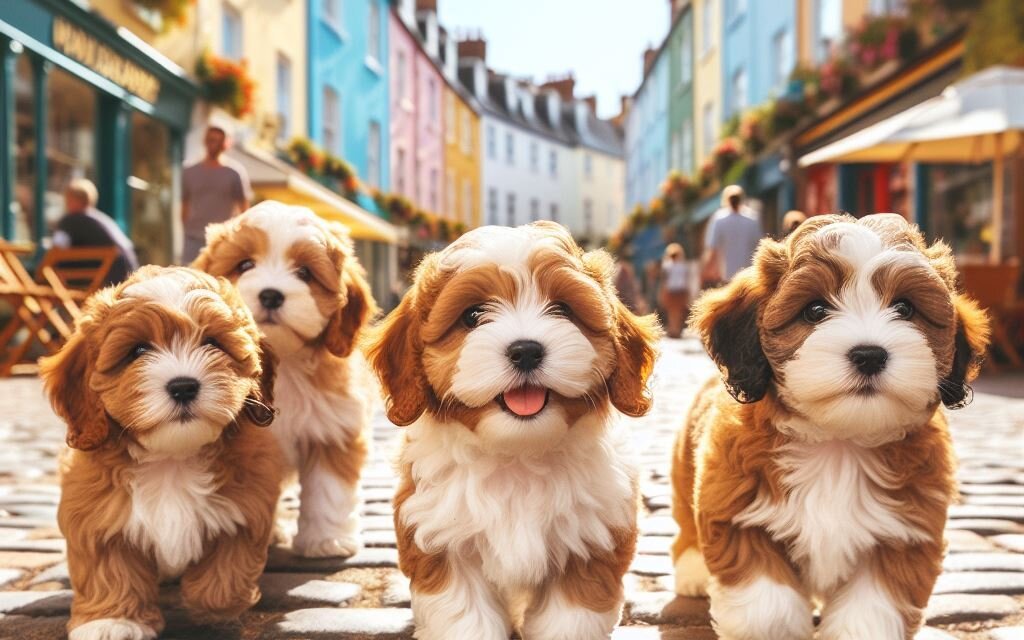
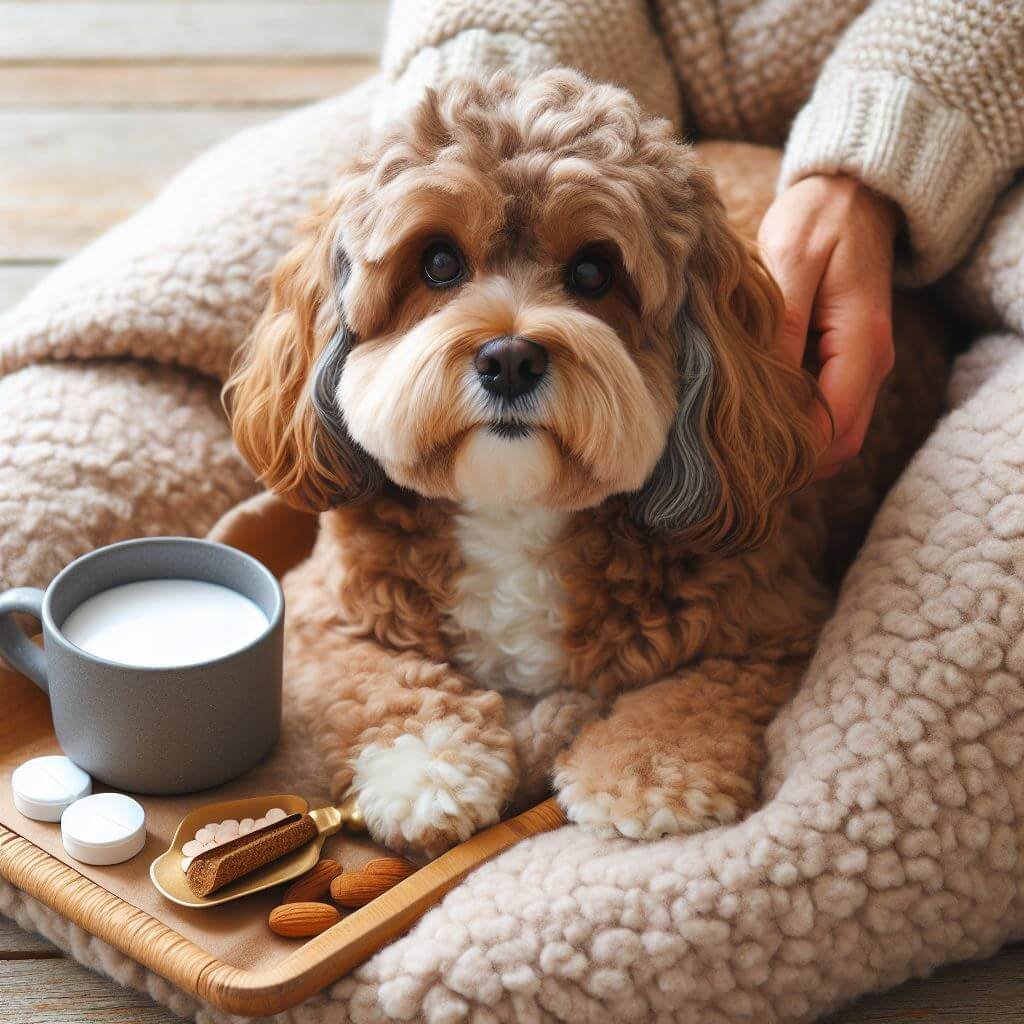
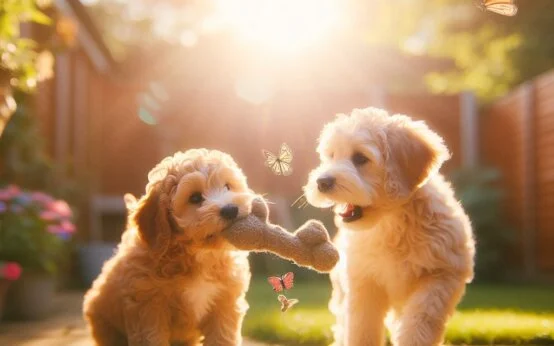 Mini Labradoodle: A Complete Guide
Mini Labradoodle: A Complete Guide 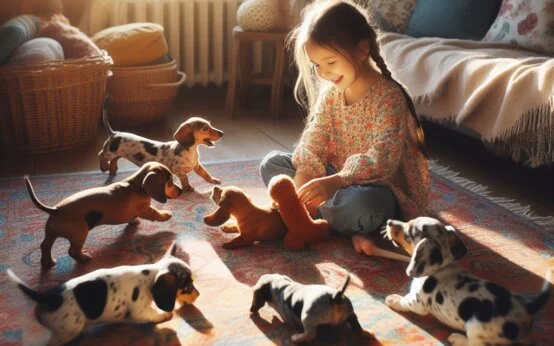 Dapple Dachshund: A Unique and Lively Breed
Dapple Dachshund: A Unique and Lively Breed 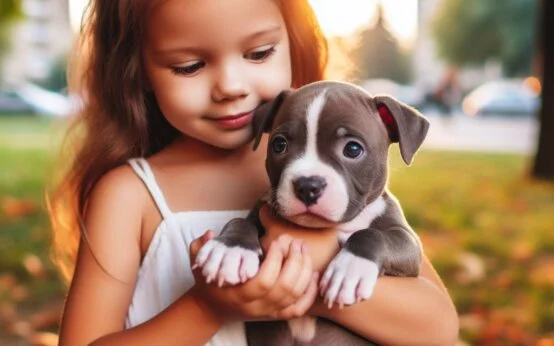 Pocket Pitbull: A Compact Canine Companion
Pocket Pitbull: A Compact Canine Companion 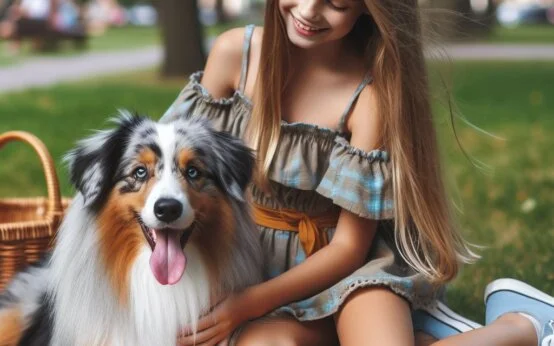 The Blue Merle Australian Shepherd: A Captivating and Unique Breed
The Blue Merle Australian Shepherd: A Captivating and Unique Breed 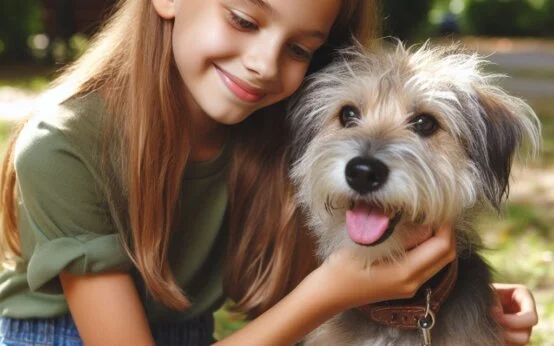 Terrier Mix: A Versatile and Energetic Canine Companion
Terrier Mix: A Versatile and Energetic Canine Companion 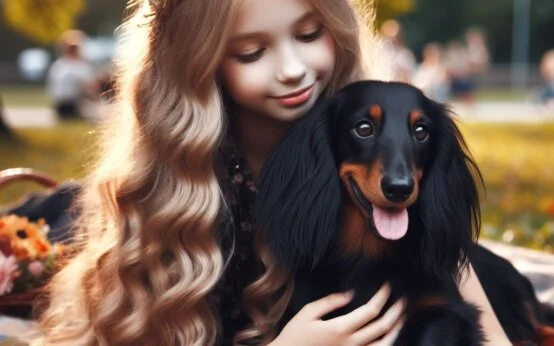 Long Haired Dachshund: A Guide to This Charming Breed
Long Haired Dachshund: A Guide to This Charming Breed  Mini Labradoodle: A Complete Guide
Mini Labradoodle: A Complete Guide 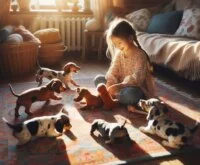 Dapple Dachshund: A Unique and Lively Breed
Dapple Dachshund: A Unique and Lively Breed  Pocket Pitbull: A Compact Canine Companion
Pocket Pitbull: A Compact Canine Companion  Preparing for an Adventure: A Golden Retriever Packs Its Suitcase
Preparing for an Adventure: A Golden Retriever Packs Its Suitcase 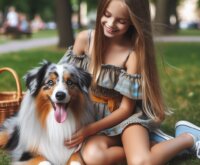 The Blue Merle Australian Shepherd: A Captivating and Unique Breed
The Blue Merle Australian Shepherd: A Captivating and Unique Breed 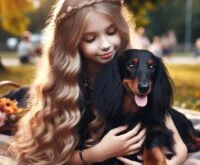 Long Haired Dachshund: A Guide to This Charming Breed
Long Haired Dachshund: A Guide to This Charming Breed